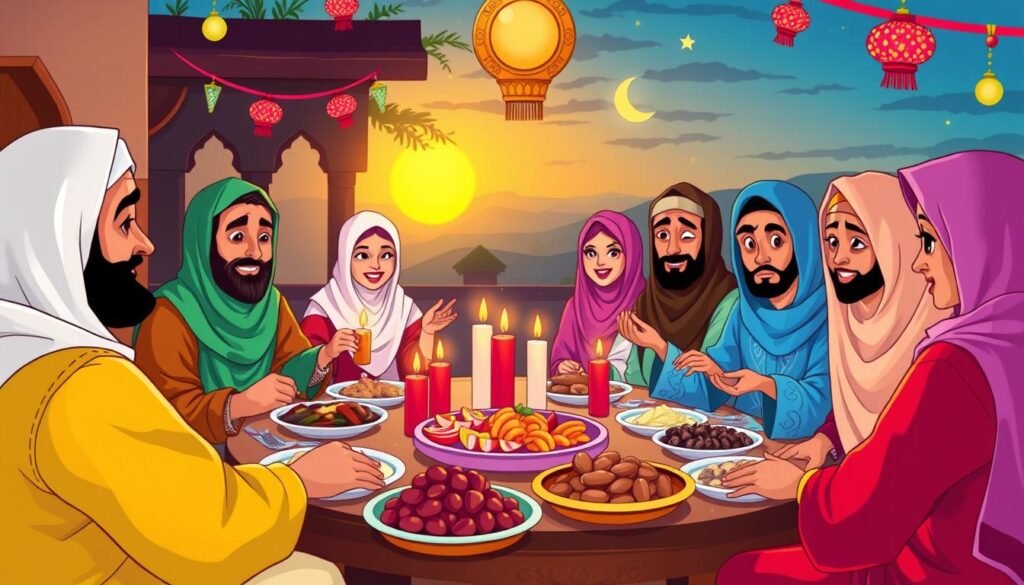Reflecting on Ramadan, I remember the Prophet’s (SAW) words on Fajr prayer. He said those who pray Fajr will be under Allah’s Protection. This shows the value of starting our day with prayer, a key part of Ramadan.
During Ramadan, we can grow closer to Allah. The Prophet’s (SAW) words guide us. Fasting from dawn to sunset reminds us of our duty to be righteous, as the Quran teaches.
Exploring the Prophet’s teachings on Ramadan, we see it’s more than just fasting. It’s about deepening our spirituality. We learn to be compassionate, generous, and reflective, values central to Ramadan and Islam.
Understanding the Sacred Words of the Prophet About Ramadan
As Ramadan approaches, I think about its importance in Islamic teachings. The Prophet Muhammad stressed the value of fasting, prayer, and charity during Ramadan. His words and actions guide Muslims worldwide.
Fasting in Ramadan is a key part of Islam, along with other pillars. It’s a duty for adult Muslims who can do it without hardship.
The Prophet Muhammad’s teachings on Ramadan are full of wisdom. He said, “Ramadan is the month in which the Quran was revealed”. This shows Ramadan’s deep connection to the holy book.
He also highlighted the importance of fasting, prayer, and charity in Ramadan. These remind us of the need for spiritual growth and self-reflection during this month.
As Ramadan comes, we remember the Prophet’s words and actions. His teachings on fasting, prayer, and charity guide us. They remind us of Ramadan’s spiritual value.
By following the Prophet’s teachings, we can fully enjoy Ramadan. We can gain spiritual rewards that this month offers.
The Spiritual Rewards of Ramadan According to the Prophet
Reflecting on Ramadan, I recall the Prophet’s words on its spiritual rewards. From an Islamic view, Ramadan is a time for spiritual growth and renewal. It offers many chances for Muslims to deepen their bond with Allah.
The Prophet Muhammad (PBUH) stressed the value of fasting, prayer, and charity in Ramadan. He showed how these acts of worship can bring great spiritual rewards.
Ramadan is a month for forgiveness, a time to seek pardon for sins. The Prophet’s teachings urge Muslims to use this sacred time to recharge their spiritual batteries and refocus their priorities. This way, Muslims can find peace, tranquility, and contentment, improving their well-being and relationships.
The spiritual rewards of Ramadan benefit not just the individual but also the community. The Prophet’s teachings on charity and generosity during Ramadan inspire Muslims to think of others. By sharing their blessings, Muslims can build unity and solidarity, essential for strong communities.
Ramadan is a month of spiritual growth, a time for Muslims to draw closer to Allah. The Prophet Muhammad (PBUH) reminded us of Ramadan’s many spiritual rewards. These rewards offer Muslims a chance to transform their lives and serve Allah better.
Essential Hadith About Ramadan: The Prophet’s Most Powerful Teachings
Exploring Ramadan’s essence means looking into the Hadith about Ramadan. It gives us insights into the Prophet Muhammad’s teachings during this month. The Islamic teachings show Ramadan’s importance, and the Prophet’s words guide us on how to benefit from it.
The Prophet Muhammad said Ramadan is a month where the gates of Paradise open, and Hellfire’s gates close. This means we have easier access to divine mercy and forgiveness. The Hadith stresses Ramadan’s role in spiritual growth and self-reflection.
Hadith on the Gates of Paradise
SAHIH MUSLIM, BOOK 6: The Book Of Fasting (KITAB AL-SAWM), shares a key teaching. The Prophet Muhammad said every good deed in Ramadan is rewarded tenfold, sometimes up to 700 times. This highlights Ramadan’s spiritual benefits, urging Muslims to fast, pray, and give charity.
The Prophet’s teachings on Ramadan guide and inspire Muslims. By studying these essential Hadith, we gain a deeper understanding of Islamic teachings and Ramadan’s significance.
The Prophet’s Personal Practices During Ramadan
As Ramadan comes near, I think about Prophet Muhammad’s habits. They guide Muslims everywhere. He focused on fasting, prayer, and giving to others. One of the most notable aspects of the Prophet’s personal practices is his strict adherence to fasting. It’s a key part of Islam.
The Prophet would wake up for suhoor, the pre-dawn meal, and pray. He also gave to the poor, showing the importance of charity.
He led Taraweeh prayers, special night prayers in Ramadan. He also read the Qur’an with Jibreel every night. These actions show the value of spiritual devotion in Ramadan. By following his example, we can grow closer to our faith and each other.
Prophetic Guidance on Breaking the Fast
Exploring Ramadan’s Islamic teachings, we find the Prophet Muhammad’s advice on breaking the fast is key. Breaking the fast is a big part of Ramadan. The Prophet Muhammad gave us important tips on how to do it right.
He taught us to break the fast with dates and water. Many Muslims follow this practice during Ramadan.
The Recommended Duas for Iftar
The Prophet Muhammad suggested special duas for when we break our fast. These duas help us thank Allah for food and drink. They teach us to be humble and thankful for life’s simple joys.
The Sunnah Method of Breaking Fast
The Prophet Muhammad showed us a simple way to break the fast. He ate dates and drank water, then prayed in the evening. This teaches us that breaking the fast is more than just eating and drinking. It’s about spiritual renewal and connecting with Allah.
Following the Prophet Muhammad’s advice on breaking the fast brings joy and blessings in Ramadan. His teachings remind us of the value of gratitude, humility, and spiritual growth. They highlight Ramadan’s importance for personal and spiritual development.
The Social Aspects of Ramadan in Prophetic Traditions
Reflecting on Ramadan, I see how vital social aspects are. From an Islamic perspective, it’s not just about personal growth. It’s also about building community and unity among Muslims.
In Ramadan, social aspects include many activities. These are Taraweeh prayers, visiting the sick, and helping the needy. While fasting and praying, we think of those less fortunate. We’re urged to help them, showing compassion and empathy.

Exploring Ramadan’s social side, we find the Prophet Muhammad’s wisdom. He taught us Ramadan is for spiritual growth, self-reflection, and coming together. Embracing Ramadan’s social side helps us connect with others and understand this month better.
As the Prophet Muhammad said, “Ramadan is a month of blessing, a month of mercy, a month of forgiveness.” Let’s live these values in Ramadan. Let’s build a kinder, stronger community together.
The Prophet’s Teachings on Night Prayers During Ramadan
As Ramadan comes, Muslims worldwide get ready for a month of spiritual growth. The Prophet Muhammad stressed the value of night prayers during Ramadan. He said that praying at night with true faith can wipe out all past sins. This is based on Islamic teachings.
The Prophet Muhammad himself prayed no more than eleven Rakats during Ramadan. His practice of Taraweeh, a voluntary prayer after Isha, inspires many Muslims.
The Significance of Taraweeh
Taraweeh prayers are key in Ramadan. The Prophet Muhammad led these prayers in congregation for a few nights. He then stopped to prevent it from becoming mandatory. Taraweeh is important for both spiritual reflection and community bonding in Ramadan.
Guidelines for Qiyam al-Layl
The Prophet Muhammad gave rules for Qiyam al-Layl, the night prayers. He stressed the need for sincerity and faith. He also pointed out the Night of Qadr on nights like the 21st, 23rd, and 25th of Ramadan.
Special Devotions in the Last Ten Nights
The last ten nights of Ramadan are special for devotion and prayer. The Prophet Muhammad practiced Itikaf, a spiritual retreat, during this time. He also kept his family awake for night prayers, showing the importance of praying together during this time.
Charitable Acts and Their Rewards in Ramadan
Exploring Ramadan reveals its importance in charity. From an Islamic view, Ramadan is a time for good deeds, like giving charity. These acts are rewarded greatly, with one good deed earning 10 to 700 times more.
The Prophet Muhammad (PBUH) stressed the need for generosity in Ramadan. He said feeding someone who is breaking their fast is as rewarding as the fasting person’s act. This shows the importance of Sadaqah and charity in Ramadan. The Prophet’s teachings inspire Muslims to give generously during this month.
The Multiplied Benefits of Sadaqah
Sadaqah, or voluntary charity, is key in Ramadan. It benefits not just the giver but also the community. By giving Sadaqah, Muslims help meet social needs and earn Allah’s blessings. The Islamic view encourages giving generously, promising rewards and a chance to help others.
Feeding the Fasting Person
Feeding someone who is fasting is a highly rewarded act in Ramadan. The Prophet Muhammad (PBUH) said it’s as rewarding as the fasting person’s act. This highlights the value of supporting those fasting and building community through charity.
Common Mistakes to Avoid According to Prophetic Guidance
Following Prophet Muhammad’s teachings is key during Ramadan. Islamic teachings stress the need to check hadiths. The Prophet warned against lying about his words. One big mistake is skipping Sunnah rak‘ahs after ‘Ishaa’ prayers, seen in some Ramadan gatherings.
Rushing to end iftar without saying azan is another error. It means missing out on rewards. At-Taraaweeh prayer attendees should avoid holding mus-hafs too tightly and recite quickly. This can ruin the peaceful and focused nature of their prayers. Islamic teachings also warn against spending too much on food and drink. We should focus on giving zakah and avoiding major sins.
Prophet Muhammad taught that eating too much can harm our health and make us tired. It’s important to eat right, with one-third of our plate for food, one-third for liquid, and one-third for breathing. By following his advice, we can make Ramadan more meaningful and connect closer with Allah.

According to the Hadith, “Whoever tells a lie against me (intentionally)…” – this emphasizes the importance of verifying hadiths and following the Prophet’s teachings accurately.
By being careful of these mistakes and following the Prophet’s guidance, we can have a more fulfilling Ramadan. As we try to avoid errors and follow Islamic teachings, we deepen our understanding of Prophet Muhammad’s wisdom. We also see the importance of Ramadan in our lives.
Embracing the Transformative Power of Prophetic Wisdom in Ramadan
As Ramadan draws near, we reflect on the prophetic wisdom that changes us. The Prophet Muhammad’s teachings light our way. They guide us to a deeper Islamic perspective and closer to God.
Ramadan is a time for spiritual renewal. It calls us to follow the Prophet’s wisdom. By doing so, we can find a deeper connection with our faith and a new purpose in life.
The Prophet’s teachings highlight the importance of self-reflection, discipline, and kindness. These values are key during Ramadan. As we fast, pray, and give to others, we align with God’s will. This makes us agents of positive change in our communities.
Embracing the Prophet’s wisdom gives us comfort. We know we’re not alone on this journey. With the Prophet’s guidance and the support of our community, Ramadan can be a transformative experience. It can change us and those around us forever.
FAQ
What is the significance of the Prophet’s words on Ramadan for Muslims?
How do the Prophet’s teachings on the divine status of prophetic traditions and the special place of Ramadan contribute to our understanding of this month?
What are the key spiritual rewards of Ramadan according to the Prophet’s teachings?
What are some of the most essential Hadith about Ramadan mentioned in the Prophet’s teachings?
How did the Prophet personally practice and observe Ramadan?
What are the Prophet’s teachings on the proper way to break the fast during Ramadan?
How do the Prophet’s teachings on the social aspects of Ramadan contribute to the community spirit during this month?
What are the key teachings of the Prophet regarding night prayers during Ramadan?
What are the Prophet’s teachings on the importance of charitable acts during Ramadan?
What are some of the common mistakes that the Prophet’s teachings warn Muslims to avoid during Ramadan?
How can Muslims embrace the transformative power of the Prophet’s wisdom in Ramadan?

Embracing Faith, One Insight at a Time!
The teachings of the Quran have always guided my path. With a deep passion for Islamic knowledge, I strive to blend the wisdom of tradition with the relevance of today, making the timeless messages of Islam accessible and meaningful for everyone.
Muslim Culture Hub is my platform to share historical insights and thought-provoking articles, exploring both well-known and lesser-discussed aspects of Islamic culture and beliefs. My mission is to create an inclusive online space where everyone can learn, strengthen their faith, and connect with the profound message of Islam.
Join the journey!
May peace be upon you.








